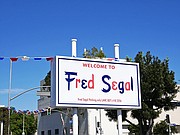Fred Segal Sign Center of Lawsuit
Retail
As of Thursday, October 13, 2016
In the fast-changing world of Los Angeles boutique retail, the red, white and blue logo of Fred Segal has been an icon for decades, but a recently filed lawsuit might decide whether the famous sign can stay or must go at the first Fred Segal store opened on Melrose Avenue.
Last month, Sandow, the New York–headquartered company that acquired the rights to the Fred Segal brand in 2012, went to U.S. District Court in Los Angeles and sued the new owner of the Fred Segal building at 8100 Melrose Ave. for trademark infringement and unfair competition.
The building is now owned by CormackHill, a Canadian real estate company that purchased the 29,000-square-foot compound last March for $43 million, media reports said.
According to Sandow’s legal complaint, CormackHill has illegally appropriated the famed Fred Segal trademark. “[It] had deceived consumers and traded on plaintiff’s goodwill by maintaining a Fred Segal sign on the building, even though the location no longer has any association with Fred Segal.”
In its legal papers, Sandow said it attempted to negotiate an agreement with CormackHill for the use of the trademark. But the complaint said the real estate company did not recognize Sandow’s rights and would not remove the Fred Segal signs on the building.
Keeping the sign up could match a king’s ransom. The value of the license of the Fred Segal marks exceeds $200,000 to $500,000 a month, court papers said.
Sandow’s lawyers from the law firm Russ, August & Kabat asked for a jury trial, punitive damages and an award for treble the damages their client has suffered, which will be determined at trial. According to court papers filed Sept. 28, a lawyer for CormackHill requested more than 30 days to respond to the complaint.
For much of its history, the Melrose Avenue site was the address for some well-heeled boutique retailers who had shops within the Fred Segal building.
According to their leases, tenants had the right to use the Fred Segal name, but the original tenants who held those rights have since moved out of the building, the complaint maintained. So Sandow now has free rein to enforce its trademark rights, the lawsuit said.
The Melrose property remains a place of business for high-profile boutique retailers Ron Robinson, Ron Herman and for Mauro’s Café.
Removing the Fred Segal sign on the Melrose Avenue store might have dire consequences for the retailers still doing business there, according to legal experts.
“If a retailer wants to be in the space to bask in the glow of the Fred Segal name and what it means to local consumers, then losing the name will have significant negative effect on the building and the value of the leases within are worth less than what might otherwise be,” said Doug Lipstone, a trademark attorney.
Tenants might use the loss of the trademark name to get out of their leases and leave the building, he added.
However, if shoppers aren’t visiting the building because of the Fred Segal name, then the loss of the trademark may not hurt the retailers in the building, said Lipstone, who is a partner with the law firm Weinberg Gonser LLP.
For many years, Fred Segal also ran a retail compound similar to its Melrose property in Santa Monica, Calif. The 500 Broadway section of the property closed in 2014 after being purchased by DK Broadway LLC to make way for a seven-story mixed-use apartment building. This year, the Fred Segal Santa Monica building across the street at 420 Broadway, owned by 420 Broadway LLC, shuttered its doors.
Since acquiring the rights to the Fred Segal name, Sandow has opened a handful of Fred Segal stores. Currently it runs a Fred Segal store at the Tom Bradley Terminal at Los Angeles International Airport, and it has two boutiques in Japan.
Much publicity was given to the seven stores it opened in August 2014, which covered 10,000 square feet at the SLS Las Vegas casino on the Las Vegas Strip. The Fred Segal Collective, as the stores were called, closed one year later.
Paul Blum, the businessman who came on board in 2014 as the new Fred Segal chief executive and who helped shepherd Sandow’s initial Fred Segal expansion, has since moved on. In February, he was named the chief executive of L Brand Inc.’s Henri Bendel division.
Two years ago, Sandow forecast that it would open up to 10 Fred Segal lifestyle centers, both domestically and overseas, in the next five to seven years. Their focus would be on fashion, dining, entertainment and cultural events as well as health and wellness programs in spaces of 50,000 square feet or less.
Sandow has reportedly been looking for real estate to open a new store in the Los Angeles area. Earlier this year, media reports said that Fred Segal was opening an outpost in the Playa del Rey area of Los Angeles, a short drive from LAX. Monica Del Borrello, a Sandow representative, said the company would be announcing new-store ventures in upcoming weeks.
Two years ago, Sandow partnered with equity investor Evolution Media Partners to expand the Fred Segal venture. Evolution is a joint venture between TPG Growth, Participant Media and Evolution Media Capital, an entertainment, media and sports merchant bank formed in partnership with Creative Artists Agency.
Talent agency CAA was supposed to be consulting in areas such as licensing, branding, digital strategy and content creation, among other things.
In August, Sandow launched a new Fred Segal apparel line called Fred by Fred Segal. The collection consists of T-shirts, jeans and cashmere.
